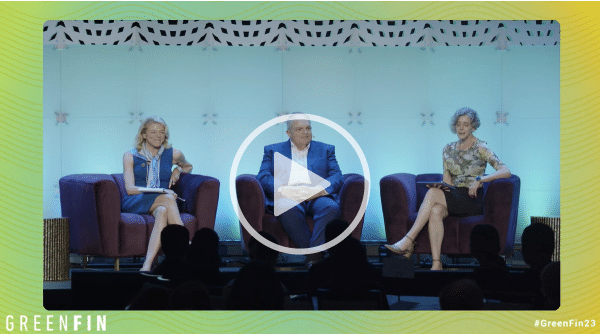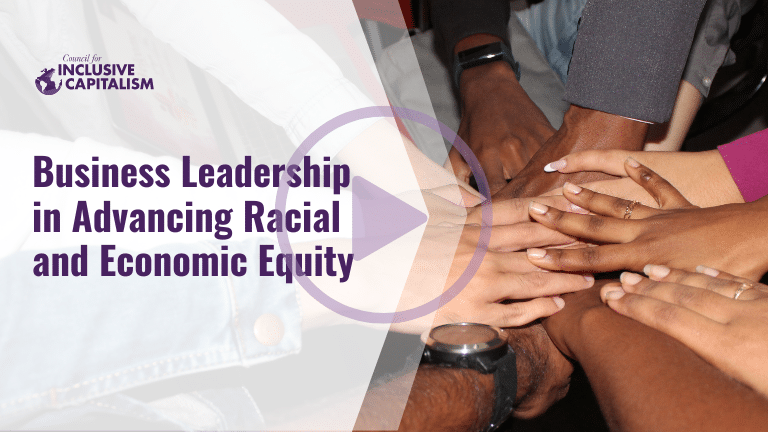Newsletter | We need engagement, not divestment

Newsletter from the Council for Inclusive Capitalism
With the need for accelerated decarbonization timeline ever more urgent, divestment has gained popularity as a means of expressing dissent with the pace of change in the fossil fuel industry – nearly 1,600 institutions have divested a total of $40.51 trillion from fossil fuel assets – and the divestment movement continues to grow. In January, California, the fifth largest economy in the world, proposed a suite of legislation which calls for state retirement funds to divest from oil and gas companies, and banks and financial institutions, notably in Europe, are reducing investment targets or vowing to stop funding new projects. This approach has the potential to be costly for both our planet and for shareholders.
For the transition to succeed at the pace and scale needed, engagement is unquestionably the more effective investor strategy. Investor engagement will drive the transition far better than divestment campaigns and holds potential for much greater impact. By having hard net zero conversations with companies an tying capital to transition strategies that reflect companies’ unique business models and assets, investors will catalyze the change we need while aligning financial interests with sustainability.
I recently joined my friend, Council steering committee member and State Street CEO Ron O’Hanley, on the main stage at GreenFin to make the case for shareholder engagement. As investors, I believe that we should prioritize engagement because we have a real problem to solve, and you can’t solve a problem without engaging with solutions. The point is to go into the problem.
As Ron said, “Divestment makes people feel good, but it has nothing to do with atmospheric decarbonization. If I sell oil and gas out of my portfolio, I have a decarbonized portfolio, but the air you and I are breathing hasn’t changed, the amount of carbon in the atmosphere hasn’t changed. . . Divestment is almost the opposite of what we need to do.”
The choice facing investors is whether they are ready to be hands on in helping companies steer toward net zero. Embracing the power of shareholder voice is not only a strategic choice but also a responsible one –a choice that can shape a better and more sustainable future for society, the environment and the economy at large.
You can watch my full conversation with Ron and Greenbiz’s Heather Clancy below. If you haven’t already, I hope you’ll consider joining us at the Council for Inclusive Capitalism, continue to stay in touch on critical issues like this, and share the actions you are taking for more value creation and lasting long-term growth.

Lynn Forester de Rothschild
Founder and Co-Chair

View more than 170 company actions to protect the planet, including biodiversity and life on land.
INVITING COUNCIL MEMBER COMMENT TO STANDARD-SETTERS ON DEVELOPING A SOCIAL STANDARD
Working at the intersection of business and human rights, Council Ally Shift works with standard setter, companies, financial institutions, and civic groups among other to place the needs of people at the core of standards and business and investor practices, recognizing the material effects of human rights and inequality on enterprise value.
Following this week’s release of its inaugural global sustainability disclosure standards, the International Sustainability Standards Board (ISSB) is seeking feedback on its priorities for its next two-year work plan and welcomes public comments through this online survey until September 1st.
The Council joins Shift in encouraging Council members and all who recognize the significance of social issues for material financial disclosures to provide comment by the September 1 deadline. To aid those crafting a response, Shift, World Benchmarking Alliance, and B Team offer this memo of key messages and findings on social-related issues and disclosure and the need for the development of a general social standard to provide clarity to providers of capital.
The Council also encourages relevant members to take up ISSB’s global sustainability (S1 and S2) standards released on July 26 to drive harmonization across standards and sustainable value creation across sectors and geographies. Learn more about the new S1 and S2 standards.

EVENT RECAP: BUSINESS LEADERSHIP IN ADVANCING RACIAL AND ECONOMIC EQUITY
Racial and economic equity are inextricably linked, with more than half of the economically insecure people in the United States being people of color. Leaders from Council Ally PolicyLink and outdoor consumer goods co-operative REI joined the Council for a learning series webinar on how the businesses can drive greater value creation and better serve their consumers by incorporating racial and economic equity into their business model and practices.
NEW INSIGHTS FROM COUNCIL MEMBERS
Tasting Success: Auspice Social’s Recipe for Meaningful Employment and Inclusion:
This Indian spice-packaging company embraces workers with autism spectrum disorder, connects everyone to valuable work, and is developing a loyal workforce and business value in the process.
New Majority Capital: Closing Racial and Gender Wealth Gaps Through Small Business Ownership
As millions of American business owners retire in the next decade, NMC is working to help them transition valuable assets to diverse new owners to keep good businesses going and grow greater prosperity.
Affordable Building, Sustainable Futures: Mākhers Studio Pursues Equity Through Modular Construction
Rising construction and land costs pose big challenges for urban affordable housing. This Atlanta-based firm fills the gap with small-footprint, climate-resilient homes for the underserved.
NESTLÉ HIGHLIGHTS PROGRESS ON FARMERS’ TRANSITION TO REGENERATIVE AGRICULTURE
The highest quality products account for their impact on people and the planet. For years, the Nestlé coffee brand Nescafé has worked to support producers in its supply chain. Last year, the company launched the Nescafé Plan 2030 to further drive regenerative agriculture, reduce greenhouse gas emissions and improve farmer’s livelihoods. A newly-released progress report shows that farmers are gradually adopting regenerative agricultural practices and improving farming yields and farmer benefit.
In 2022, Nescafé distributed 23 million disease and drought-resistant, high-yield coffee plantlets to help rejuvenate coffee plots, increase productivity and reduce the use of agrochemicals. Farmer trainings on regenerative agricultural practices reached more than 100,000 farmers in 14 countries. In addition, 1.4 million trees were planted in and around coffee farms that supply coffee to Nescafé, providing shade to prevent coffee’s over-exposure to the sun and additional revenue sources for farmers.
Learn more about the impact assessment conducted by Nescafé in partnership with the Rainforest Alliance.
ALLY RESOURCE: Nature Finance offers investor guide to nature-related risk accounting
Natural capital is the bedrock of all economic activity. The financial sector may do much through its financing patterns to drive nature destruction or regeneration based on how well nature-related pressures and dependencies are accounted for.
Led by Council Ally Simon Zadek, Nature Finance (formerly known as Finance for Biodiversity) offers resources to help financial professionals align their practices with equitable, nature-positive outcomes. Their latest guide offers suggestions for how to integrate nature data into ESG screening processes. They outline a three-step method:
- Identify priority industries in the portfolio with largest impacts and dependencies on nature using a matrix approach.
- Assess risks, starting with data already collected for climate-related risk analysis and expanding to additional data sources highlighted in the guide.
- Respond to known and newly-identified risks, applying assessment knowledge to financial decisions and stewardship.
The guide provides assessment tools, example exercises, and lists of public data sets for investors can leverage. Download the guide to learn more.
WELCOME NEW COUNCIL MEMBERS
Jacqueline Novogratz
Founder and CEO, Acumen
Cecilia Foxworthy
CEO, Agora Partnerships
Frank Aswani
CEO, African Venture Philanthropy Alliance (AVPA)
Zahid Torres Rahman
Co-Founder and CEO, Business Fights Poverty
Naoko Ishii
Director, Center for Global Commons | University of Tokyo
Ruth Rodriguez
Founder, Chair, and CEO; Chiqui Rodriguez Inc.
Daniel Vafi
Co-Founder, Circleg
Rohan Shah
CEO, Classavo
Sheru Chowdhry
Founder and Chief Investment Officer, DSC Meridian Capital, LP
Stephanie Udler
Fractional Sustainability Executive and Independent Consultant, Generations – Sustainability Executive Services
Innocent Havyarimana
Founder and CEO, GLAP Enterprises
Osamu Hoshino
CEO, Headspring Inc.
Lauren Ungeldi
CEO, IKAR Global
Marc de Swann Arons
Founder, Institute for Real Growth
Frank van den Driest
Founder, Institute for Real Growth
Simon Schmid
Director, Just Skills Hub – SkillLab
Nesrin Karaoğlu Otuzoğlu
CEO, Karaoğlu Peyzaj
Banu Aydogan
Founder, Keypoint Strategy & Communications Consultancy
Mariela Salas
Executive Director, LatinxVC
Layal Jebran
CEO, Moubarmij
Thomas Williams
CEO, North American Properties
Ezenwa Jeremiah
Founder, The Palms African Processing Ltd
George Kramb
Co-Founder and CEO, PatientPartner
Alexandra Clare
CEO, Re:Coded
Andrew Watson
Founder, Rethinking Capital
Blair Fitzgibbon
Founder, Slipstream PR
Pankaj Agarwal
Managing Director, Treta Agro Pvt. Ptd.
INCLUSIVE CAPITALISM IN THE NEWS
National Law Review | Study explore link between a company’s ESG focus and its financial performance
Power Philippines | Eric Francia: ACEN could achieve 5GW renewables capacity before 2025
CBC | Marc Benioff: Can the Great Reset really create a gentler, more equitable capitalism?
Energy Digital | Alistair Phillips-Davies: SSE unveils plans to invest £40 billion in clean energy
Bilionaryo | Jaime August Zobel de Ayala: Win-win solution: JAZA makes the case for inclusive capitalism
Wall Street Journal | Darren Walker: Ford Foundation drives push for diversity in asset managers
Reuters | Brand Watch: Big business promises to tackle inequality, but activists are dubious
Tampa Bay Times | Yale and Harvard still have much to teach Gov. DeSantis (column)
Council for Inclusive Capitalism | Azhar Qureshi, Eco-Conservation Initiatives (ECI): Capacity building of WWF-Pakistan’s CBOS on sustainable management and production of mangrove forests in the coastal areas of Pakistan
Just Capital | Just Report: Transparency on racial pay equity increased from 15% to 24% in 2023, with disclosure more common among companies that disclose detailed demographic data
Philanthropy News Digest | Rajiv Shah: Rockefeller Foundation, GEAPP announce Coal to Clean Credit Initiative
